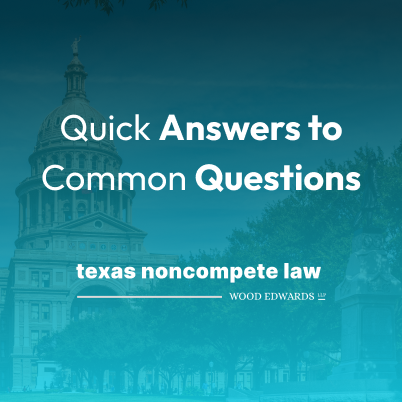
Below you’ll find answers to the 16 questions I get more than any other about Texas noncompete law. Each answer is short and to the point. For almost every question I have also provided a link to a related post that addresses the question in greater detail and with more nuance.
1. What is required for a covenant not to compete to be enforceable in Texas?
In Texas, a non-compete must have reasonable limitations, offer adequate consideration, and protect legitimate business interests to be enforceable.
Read: Are Non-Compete Agreements Enforceable in Texas in 2024?
2. How do I get out of a non-compete agreement in Texas?
To get out of a non-compete agreement in Texas, you may negotiate with your employer, prove that the terms are unreasonable or unenforceable, or show that it violates legal standards.
Read: How can I get out of a non-compete agreement in Texas?
3. Do non-competes hold up in court in Texas?
Texas courts generally disfavor non-compete agreements but will enforce them if they are reasonable in scope, duration, geographic limitations, and protect legitimate business interests.
Read: Reasonable noncompete agreements can be enforceable
4. Can a company keep you from working for a competitor in Texas?
Yes, a company can prevent you from working for a competitor in Texas if you have signed a valid and enforceable non-compete agreement. Review the terms carefully and consult an attorney for any concerns.
5. Does a non-compete hold up if you are laid off in Texas?
In Texas, the enforceability of a non-compete does not change if you are laid off. Its validity depends on factors like consideration given, such as sharing of trade secrets, not just employment.
Read: Are Texas Noncompete Agreements Enforceable if the Employee Is Fired?
6. How serious is a non-compete agreement?
Non-compete agreements are legally binding in Texas and can have significant career implications. Violating these agreements can lead to legal consequences, including injunctions and damages.
7. What happens if you break or violate a non-compete in Texas?
Breaking a non-compete in Texas can result in legal action against you, such as injunctions preventing further violations and potential damages for losses caused to the employer.
Read: Can a Noncompete Be Extended If It Is Violated?
8. Can an independent contractor be held to a non-compete in Texas?
Yes, in Texas, an independent contractor can be bound by a non-compete if it meets the standard legal requirements for enforceability.
Read: Do Texas noncompete agreements apply to independent contractors?
9. Can you have a non-compete agreement with no geographic limitations in Texas?
A non-compete agreement in Texas must have reasonable geographic limitations to be enforceable. Agreements without any geographic limit are likely to be considered unreasonable.
Read: Geographic Limitations on Texas Non Competes?
10. Will non-compete agreements be banned in 2025?
As of now, there is no legislation in Texas indicating that non-compete agreements will be banned in 2025.
Read: No, the Biden Administration Has Not Banned Non-Compete Agreements
11. What voids/nullifies/invalidates a non-compete agreement in Texas?
A non-compete in Texas is void if it has unreasonable terms, lacks adequate consideration, or doesn’t protect legitimate business interests.
Read: Texas Federal Court Voids Noncompete Agreement
12. How long can a non-compete be in Texas?
The duration of a non-compete in Texas should be reasonable. Typically, a period of up to 2 years is considered reasonable, depending on the circumstances.
Read: Can Duration of Non-Compete Agreements be “Equitably Extended”?
13. What is good consideration for a Texas non-compete?
Good consideration for a Texas non-compete includes benefits like access to trade secrets, specialized training, or confidential information, beyond mere employment.
Read: Possible Tort Claim Not Sufficient Consideration for Noncompete in Texas
14. What is the Covenant Not to Compete Act in Texas?
The Covenant Not to Compete Act in Texas sets legal standards for enforceable non-competes, including reasonable limitations on time, geography, and scope.
Read: Texas Covenants Not to Compete: Trial Courts Must Strike Proper Balance
15. Can I be fired for refusing to sign a non-compete agreement in Texas?
Yes, Texas is an at-will employment state, which means your employer can terminate your employment if you decline to sign—unless doing so violates a contract or public policy.
16. What is a ‘reasonable’ geographic limitation?
This depends on the nature of the business and the employee’s role. A limitation in Texas non-compete law must not be broader than necessary. Typically, it only covers areas where the company actually does business.
Need Answers About Texas Non-Compete Law?
Whether you’re an employer looking to protect your business or a professional wondering “Are non-competes enforceable in Texas?”, Robert Wood can help you navigate the complexities of Texas non-compete law with clarity and confidence. With decades of experience representing both businesses and individuals in noncompete litigation, Robert offers practical guidance tailored to your situation—whether that means litigation or a more strategic, collaborative approach.
Get non-compete help from Robert Wood today to discuss how Texas non-compete law applies to your case and protect your interests before issues escalate.

